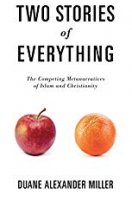The author has done us a great favor in providing a comparison of Islam and Christianity as competing and irreconcilable metanarratives. Miller’s book comprises nine chapters: Protology (beginnings); Anthropology; Israel, a Failed Attempt; Jesus, the Mediator Between God and Man; Muhammad, the Prophet and Statesman; Life in the Community; The State of the Mission; Eschatology; and the Conclusion, and the book concludes with a glossary of mostly Arabic and Islamic words. In his prologue, Miller mentions a reading list to be found at the end of the book, but there is none in the Kindle version, which I read. Such a list might be present in the printed version, but the closest thing to a reading list that I found is the footnotes. Each chapter concludes with questions for discussion, thus making the book a possible resource for Sunday school, small groups, and missional communities.
Even though he is comparing and contrasting the two religions, Miller has not taken the comparative religions approach. He writes, “I believe that forcing Islam and Christianity into the enlightenment category of ‘religion’ is a harmful move” (Loc. 99). He is interested in the trajectory of each of the two stories, the two metanarratives. Miller’s examination of the narratives allows the reader to see where and how they begin, their development and coherence, and finally, how and why the stories reach their respective climax and resolution. This right-brain approach is helpful, especially since it is not written for specialists but for the Christian in the pew. I know some might benefit more from a simple listing of doctrines and ideas from each religion for comparing and contrasting. If that describes you, Miller’s book may not be for you.
Miller’s presentation of Islam’s story is spot on. He offers us a conservative, orthodox, Sunni version of Islam; since this would include the majority of Muslims, it is a wise choice. The heartbeat of each of the two metanarratives, as he sees it, is anthropology. I think this will surprise most readers. Why? One might suppose the doctrine of God is the essential and defining doctrine of any religion. Yet Miller takes an approach that is anthropocentric. It is each religion’s view of human beings that directs the story, he claims. God may have initiated the story, but the object of divine action is humankind—essentially true for both Christianity and Islam. Let the reader not be surprised; I am confident Miller will win you over in the end to the helpfulness of this perspective for his project, at least.
As much as I enjoyed the book and learned from it, it is not without some difficulties. Mostly my discomfort came not from the discussion of Islam, but of Christian theology. Or was it the author’s discomfort leaking through the pages? Miller is an Anglican attempting to walk the tightrope of discourse among his brothers of various theological stripes. I applaud him for that, yet he makes a statement that caught me off guard: “Sin is a manifestation of death” (Loc. 548).
It’s not that I disagree with the idea, but isn’t sin the cause of death? First, what was accomplished on the cross? Jesus conquered death (John 11:25–26; Rom 6:9; 1 Cor 15:54; 2 Tim 1:10; Rev 20:6), sins were forgiven (2 Cor 5:21; Heb 9:14, 28; 1 Pet 3:18), and reconciliation between God and man was begun (Rom 5:10; 2 Cor 5:19; Eph 2:13; Col 1:20). Sin and death are not something that should be separated as if they are unrelated realities (consider Romans 4:25). The NT writers habitually speak of death and sin in the same breath (1 Cor 15:17; Rom 6:23; James 1:15; Heb 2:14; Rev 20:6). So, I laud the author’s emphasis upon death. We often focus our thoughts on sin as the main problem, because it was sin that brought death, shame, dishonor, and guilt into the world. Nevertheless, Miller’s reminder to us about our separation from the God who made us is important and well noted.
One other major wrinkle in his theology appears with this statement (from chapter 4): “Ultimately, the locus of the Kingdom of God is in the person of Jesus himself and his actual, physical body. This is why the Gospel of John focuses so much on Jesus’ seven ‘I am’ statements. . . . This is also, I suspect, why his disciples must actually eat his flesh and drink his blood (John 6). Indeed, it is impossible to enter the kingdom of God apart from acceptance of the reality that Jesus is the Lord in this Kingdom” (Loc. 567).
Had Miller not added “actually” to his statement about eating and drinking Jesus I would have no complaint. Because the author is Anglican, it is expected he would hold the view of transubstantiation (or a variation of it); but the confusion—at least in my mind—comes when I try to marry the statement above with his final phrase of the paragraph which states how one enters the kingdom. I may be nit-picking, but how Miller is describing the entrance into the Kingdom seems a bit unclear. Do we do so by “actually” eating and drinking Jesus in the Lord’s Supper or do we do so by merely accepting him as Lord of the Kingdom?
Finally, I must note how I wanted to break out into applause as Miller closed the book. He makes a statement that resonates among those of us who have ministered to Muslims. It stands as both a challenge to Christians of placid faith and the challenge of Islam: “I find the public religion of Muslims (and Eastern Orthodox Christians) compelling and refreshing. Yes, sometimes it can be confrontational, but the introspective Christianity of the West with its quietism and compartmentalization strikes me as defeatist, bland, and feeble-hearted” (Loc. 1428). May the Lord use this book to stir his people in the West and elsewhere to a more vibrant faith and vital witness, especially among Muslim neighbors.
